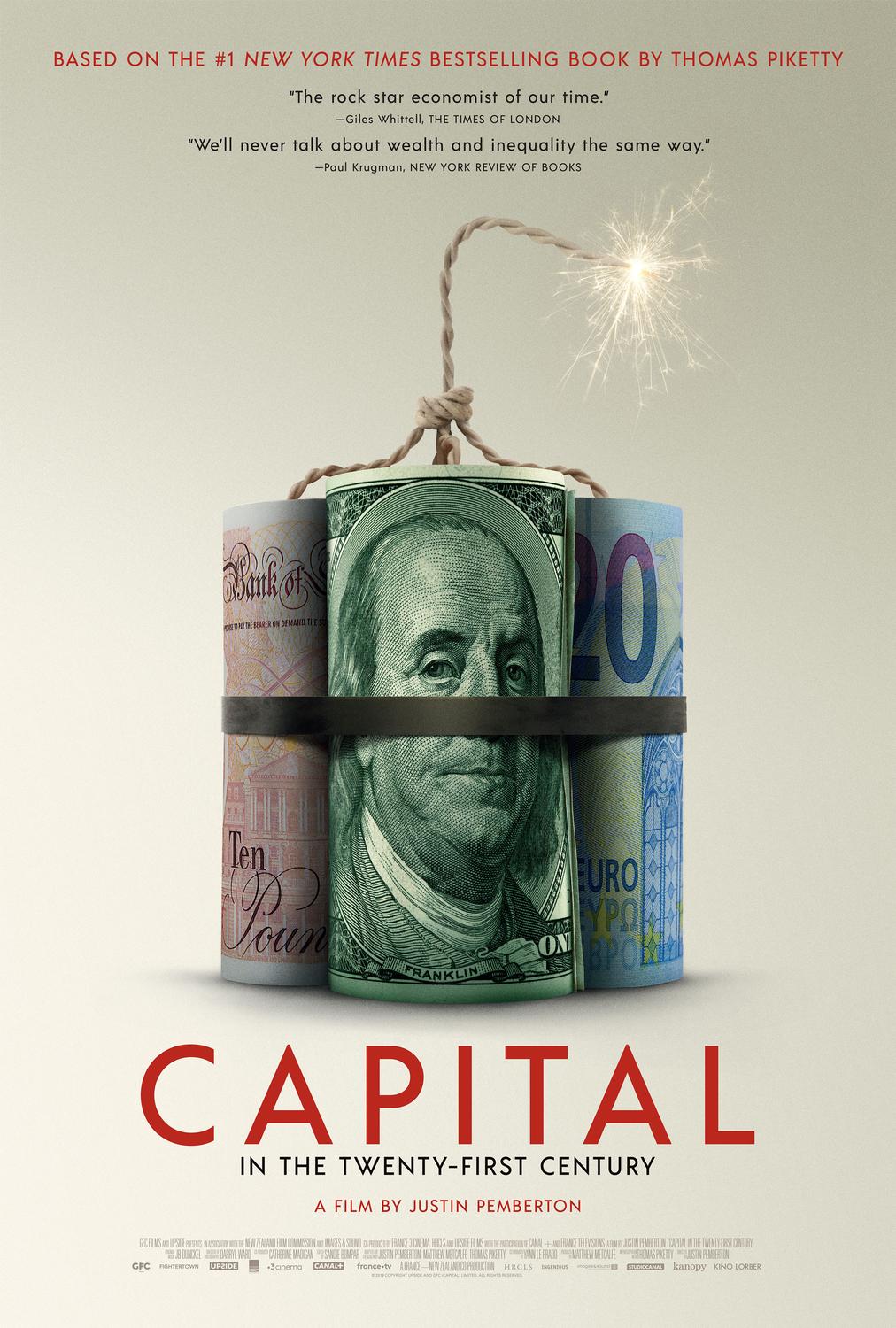
🪶 Story & Synopsis
Embark on a riveting journey through the annals of economic history with “Capital in the Twenty-First Century,” a visually captivating documentary that sheds light on the evolution of wealth distribution and inequality since the 19th century. Based on Thomas Piketty’s groundbreaking book, this film weaves together historical footage, reenactments, interviews, and stunning cinematography to offer a thought-provoking exploration of the forces shaping our current economic landscape.
The narrative delves into the core thesis of Piketty’s work, dissecting the intricate relationship between capital concentration and widening wealth gaps. By analyzing centuries of data, the film underscores how inequality is not a random occurrence but an inherent aspect of capitalism that necessitates proactive state interventions to rectify. Through compelling storytelling and bold insights, “Capital in the Twenty-First Century” challenges viewers to confront the systemic issues driving economic disparities and contemplate potential solutions to bridge the divide.
🧑 Cast & Crew
Movie Casting:
- Director: Justin Pemberton
- Writer: Thomas Piketty (book), Justin Pemberton
- Cast:
- Gillian Tett as Herself
- Kate Williams as Herself
- Rana Foroohar as Herself
- Thomas Piketty as Himself
💬 Reviews and feedback
They say you can’t judge a book by its cover, but what about a movie by its title? When it comes to “Capital in the Twenty-First Century”, you might imagine something akin to watching paint dry on a Wall Street skyscraper. However, this documentary is anything but mundane. Imagine if Sherlock Holmes traded his deerstalker hat for an economist’s cap and decided to solve the mystery of wealth inequality. Intrigued? You should be.
Plot and Themes:
This cinematic adaptation of Thomas Piketty’s bestseller isn’t your run-of-the-mill financial lecture. Director Justin Pemberton turns the dry subject matter into a gripping detective story, unraveling the secret life of capital over the last 300 years. The central thesis here is as sharp as Piketty’s original words: inequality isn’t just a glitch in capitalism’s code—it’s practically a feature, built right into its DNA. And unless we step in with some serious state interventionism, we’re looking at a future where democracy itself could be on shaky ground.
The movie opens with dramatic historical milestones like the fall of the Berlin Wall, setting the stage for an epic investigation into how capitalism has evolved—or perhaps devolved—over time. It’s like watching an economic version of The Avengers, where instead of superheroes, we get economists battling against the forces of inequality.
Acting and Characters:
While this is a documentary and doesn’t boast Hollywood A-listers acting out scenes, it features interviews with some heavyweights from academia and journalism who lend credibility and gravitas to Piketty’s arguments. Picture Morgan Freeman narrating your tax returns—it’s that engaging.
Direction:
Pemberton directs with flair, using dynamic visuals and clever editing to keep viewers hooked. He doesn’t shy away from complex concepts but breaks them down into digestible chunks that even those who snoozed through Econ 101 can grasp. The transitions are seamless; one moment you’re in 18th-century France, the next you’re knee-deep in modern-day Silicon Valley greed.
Cinematography and Production Design:
If you were expecting talking heads droning on against bland backgrounds, think again! The cinematography here is lush and visually appealing—a welcome surprise for anyone bracing for pie charts galore. The film uses eye-catching graphics to illustrate points clearly and compellingly. Think infographics on steroids.
Special Effects:
No CGI explosions or alien invasions here, but there are plenty of visual effects that make economic data come alive—turning numbers into narratives that tell a profound story about our world today.
Score:
The musical score complements the film perfectly—never intrusive but always enhancing the mood. It’s almost like listening to a well-curated playlist designed to make you ponder big ideas while tapping your foot.
Editing and Pace:
The editing deserves special mention for maintaining a brisk pace throughout what could easily have been a tedious slog through economic theory. Instead, you get quick cuts between interviews, historical footage, and animated sequences that keep your brain engaged without feeling overwhelmed.
- Binge-Watching Tips: Given its engaging nature, this documentary might be binge-worthy even though it’s just one film! Pair it with other thought-provoking documentaries like “The Corporation” or “Inside Job”. Make sure to have snacks handy—you’ll need brain fuel!
- If terms like ‘capital concentration’ make your eyes glaze over faster than reading War & Peace upside down—don’t worry! Take breaks when needed; let each segment marinate before diving back in.
- Create discussion points or questions beforehand if you’re watching with friends or family—it’ll help foster deeper conversations afterward!
Dialogues:
The dialogue (or rather monologue) isn’t just academic jargon thrown at you—it feels more like an engaging conversation with someone genuinely passionate about making sense of our economic realities today. There are moments when you’ll find yourself nodding along vigorously or uttering “Aha!” as pieces fall into place.
User Interaction:
I’ve got some questions for you:
- If capitalism were an old rock band past its prime according to Piketty’s analysis—which band would it be?
- Do you think state interventionism could actually turn things around? Or does capitalism need an entirely new playbook?
Feel free to drop your answers below or ponder these while sipping on your favorite beverage!
Conclusion:,
In summary,“Capital in the Twenty-First Century”, manages something quite remarkable: turning dense economic theory into an accessible—and even entertaining—film experience.
It paints an unsettling picture but also leaves room for hope & action highlighting how we—even non-economists—can contribute towards addressing systemic inequalities.
Whether you’re deeply invested (pun intended) in understanding our global financial systems—or simply curious about why billionaires seem intent on hoarding wealth rather than saving humanity—you’ll find this documentary both enlightening & engaging.
So grab some popcorn (and maybe even take notes). I’m giving this enlightening rollercoaster ride through history—and cautionary tale about our future—a solid:
9/10
| Pros | Cons |
|---|---|
| Visually appealing documentary | New material not well received |
| Engaging storytelling | May come across as a supplement to the book |
| Deep dive into income and wealth inequality | Focus on historical trends may not appeal to all viewers |
| Exposes effects of unchecked capitalism | Some viewers may find the subject matter dry |
Feedback
-
Capital in the Twenty-First Century (2019) - IMDb
- htcltd
- Oct 27, 2019
- How long is Capital in the Twenty-First Century?Powered by Alexa
Details
- Release date
- Countries of origin
- Official site
- Languages
- Also known as
- Capital in the 21st Century
- Production companies
- See more company credits at IMDbPro
Box office
- Gross worldwide
- $439,550
- Runtime1 hour 43 minutes
- Color
- Aspect ratio
- 2.35 : 1
-
'Capital in the Twenty-First Century': Film Review - Variety
But to invoke James Brown: Please, please, please don’t be put off by the title of “Capital in the Twenty-First Century.” It is taken, of course, from the title of the best-selling book by Thomas Piketty, the French economist who became the new rock star of wonks after the book was published in France in 2013 (it arrived in the U.S. one year later). Piketty, born in 1971, looks at everything that has led to the current moment through one defining lens: capital. Material wealth and value (money, land, property). Who has it, who doesn’t. How it waxes and wanes and shifts around over time. As surely as “follow the money” became a mantra, “Capital in the Twenty-First Century” turns “follow the capital” into a cultural-financial detective story about the evolution of the contemporary world.
-
Capital in the Twenty-First Century | Rotten Tomatoes
Capital in the Twenty-First Centurycan’t hope to address its subject with the depth of its source material, but the end result remains an eye-opening overview.
Capital in the Twenty-First CenturyWhere to WatchCapital in the Twenty-First Century
Rent Capital in the Twenty-First Century on Fandango at Home, Prime Video, or buy it on Fandango at Home, Prime Video.
What to KnowCritics ReviewsAudience ReviewsCast & Crew
Justin PembertonDirectorKate WilliamsSelfThomas PikettySelfGillian TettSelfFrancis FukuyamaSelfIan BremmerSelf
⚠️ Explanation (Spoiler)
In the documentary “Capital in the 21st Century,” based on the bestselling book by French economist Thomas Piketty, the audience is taken on a journey that explores the dynamics of power, privilege, and wealth in society. The film, directed by Justin Pemberton, delves into the concept of how the elite maintain their power by influencing the way people think.
The narrative of the movie is not presented through a series of dry statistics and graphs, unlike many other documentaries on the same subject. Instead, it weaves a captivating story that spans centuries, tracing the evolution of capitalism and its impact on society. This unique approach sets “Capital in the 21st Century” apart in popular culture, as it uses film clips to engage the audience and bring the story to life.
The central theme of the documentary revolves around the rise of the 0.1 percent and the decline of the rest of the population. It sheds light on how the elite have historically shaped societal norms and values to perpetuate their privilege across generations. Through the insights provided by experts like Gillian Tett, the chair of the U.S. editorial board of the Financial Times, the film challenges viewers to reflect on the unspoken topics that hold significant influence in society.
Thomas Piketty’s research, which forms the foundation of the documentary, reveals how wealth accumulation has outpaced economic growth throughout history. The average rate of return on capital, as highlighted by Piketty, has remained around 4% to 5% for most of human history, with fluctuations during critical periods like the Industrial Revolution and the mid-20th century. This disparity in growth rates underscores the widening wealth gap and the challenges it poses to societal equality.
Featuring a diverse range of experts such as Kate Williams, Rana Foroohar, and Joseph Stiglitz, “Capital in the 21st Century” offers a comprehensive exploration of economic history and the forces driving inequality. The film prompts viewers to question the existing social structures and the narratives that have shaped our understanding of wealth distribution and power dynamics.
By dissecting the intricate web of economic systems and societal constructs, the documentary provides a thought-provoking analysis of how capitalism has influenced our lives, often in ways that go unnoticed or unacknowledged. Through the lens of Piketty’s groundbreaking research and the engaging storytelling of Pemberton, “Capital in the 21st Century” offers a compelling narrative that challenges viewers to rethink their perceptions of wealth, power, and privilege in the modern world.
👪 Parents Guide & Age Rating
TV-14
Age rating: PG
Parental Guide:
Sex & Nudity:
The movie contains minimal sexual content, with a few brief references to wealth and power dynamics. There are no explicit scenes of nudity.
Violence & Gore:
There is no violence or gore depicted in the movie. The focus is primarily on economic and historical themes, with no graphic or disturbing scenes.
Profanity:
Occasional mild language may be heard in the movie, including some use of terms related to economic concepts. However, there are no strong profanities or offensive language.
Alcohol/Drugs/Smoking:
There are no scenes depicting alcohol, drugs, or smoking in the movie.
Frightening/Intense Scenes:
The movie is informational and documentary-based, with no intense or frightening scenes. It is suitable for all ages, but parental guidance is recommended for younger viewers due to the complex economic topics discussed.
📺 Streaming and where to watch
| streaming service | extra information |
|---|---|
| Prime Video | You can watch Capital in the Twenty-First Century on Prime Video. Rent for HD $3.99 or buy for HD $9.99. |
| IMDb | Capital in the Twenty-First Century can be streamed on IMDb for a price. |
❝ Quotes and Cult
The distribution of wealth is one of today's most widely discussed and controversial issues.
But by patiently searching for facts and patterns and calmly analysing the economic, social, and political mechanisms that might explain them, it can inform democratic debate and focus attention on the right questions.
The law of supply and demand then implies that the price of land will rise continuously, as will the rents paid to land-lords.
🤖Capital in the Twenty-First Century Reddit Talks
Capital in the Twenty-First Century is a documentary film based on the international bestseller book of the same title by economist Thomas Piketty. The film gives an in-depth look into wealth and income inequality in the 21st century.
One of the main topics of discussion on Reddit is Piketty’s argument that wealth inequality is increasing at an alarming rate. He argues that this is due to the fact that the return on capital (i.e., the income that wealthy people earn from their investments) is consistently higher than the rate of economic growth. This means that the wealthy are getting richer at a faster rate than the rest of the population.
Another topic of discussion is Piketty’s proposal for a global wealth tax. He argues that this tax would help to reduce wealth inequality and promote economic growth. However, some critics argue that a wealth tax would be difficult to implement and enforce.
Overall, the Reddit discussions about Capital in the Twenty-First Century are generally positive. Many people agree with Piketty’s analysis of wealth inequality and support his proposal for a global wealth tax. However, there are also some critics who argue that Piketty’s analysis is flawed and that his proposed solutions would not be effective.
Here are some specific examples of the different points of view, problems, reviews, and topics related to the movie that were discussed on Reddit:
- Piketty’s analysis of wealth inequality is flawed. Some critics argue that Piketty’s analysis is based on a narrow definition of wealth and that he ignores other factors that contribute to inequality, such as education and skills.
- Piketty’s proposal for a global wealth tax is unrealistic. Some critics argue that a global wealth tax would be difficult to implement and enforce. They also argue that it would be unfair to tax people on their wealth, which they may have earned through hard work and saving.
- The film is too long and technical. Some people complained that the film was too long and technical. They said that it was difficult to follow and that they lost interest after a while.
- The film is biased towards Piketty’s views. Some people accused the film of being biased towards Piketty’s views. They said that the film did not give enough attention to opposing viewpoints.
Despite these criticisms, the overall consensus on Reddit is that Capital in the Twenty-First Century is a valuable and important film. Many people said that the film helped them to understand the problem of wealth inequality and that it inspired them to get involved in the fight for economic justice.
Top discussions
- https://www.reddit.com/r/fatFIRE/comments/ircylf/what_are_your_thoughts_on_capital_in_the/
- https://www.reddit.com/r/Economics/comments/ecmvrx/thomas_pikettys_capital_in_the_twentyfirst/
- https://www.reddit.com/r/Economics/comments/wsfwpq/capital_in_the_21st_century_thomas_piketty/
- https://www.reddit.com/r/financialindependence/comments/im45fy/capital_in_the_21st_century/
- https://www.reddit.com/r/lectures/comments/67rtn8/thomas_piketty_capital_in_the_21st_century/
❓ Frequently Asked Questions
What is the main point of Capital in the Twenty First Century?
The central thesis of Capital in the Twenty-First Century is that inequality is not an accident, but rather a feature of capitalism that can only be reversed through state interventionism. The book argues that without reforming capitalism, the democratic order itself will be at risk.
Is Capital in the Twenty-First Century worth reading?
Capital in the Twenty-First Century offers a deep dive into the historical trends and dynamics of income and wealth inequality. Drawing from centuries of data, it examines how capital concentration perpetuates inequality and proposes bold solutions to address this growing divide.
What does Capital in the Twenty-First Century argue?
The book argues that inequality is a fundamental feature of capitalism and can only be reversed through state interventionism. Piketty suggests that unless capitalism is reformed, the very democratic order will be in jeopardy.
What is Piketty’s theory?
Piketty’s theory argues that as the returns on capital are more unequally distributed than labor income, a higher share of capital in the national income would lead to higher income and wealth inequality.
What is the documentary “Capital” about?
The documentary “Capital” is a visual adaptation of Thomas Piketty’s economic treatise. It explores the distribution of wealth and the increase in inequality since the 19th century. Through the use of data and analysis, it delves into the historical trends and dynamics of income inequality.
🔀 Recommended Movie and TV Show
- Lincoln: A biographical drama film about the 16th President of the United States during the Civil War.
- Fahrenheit 9/11: A documentary film by Michael Moore exploring the presidency of George W. Bush.
- Selma: A historical drama film depicting the 1965 Selma to Montgomery voting rights marches.
- The Post: A political thriller film about The Washington Post’s role in publishing the Pentagon Papers.
- Vice: A biographical comedy-drama film exploring the life of Dick Cheney.
- The Trial of the Chicago 7: A historical legal drama film depicting the trial of seven anti-Vietnam War protesters.
- V for Vendetta: A dystopian political thriller film based on the graphic novel by Alan Moore.








